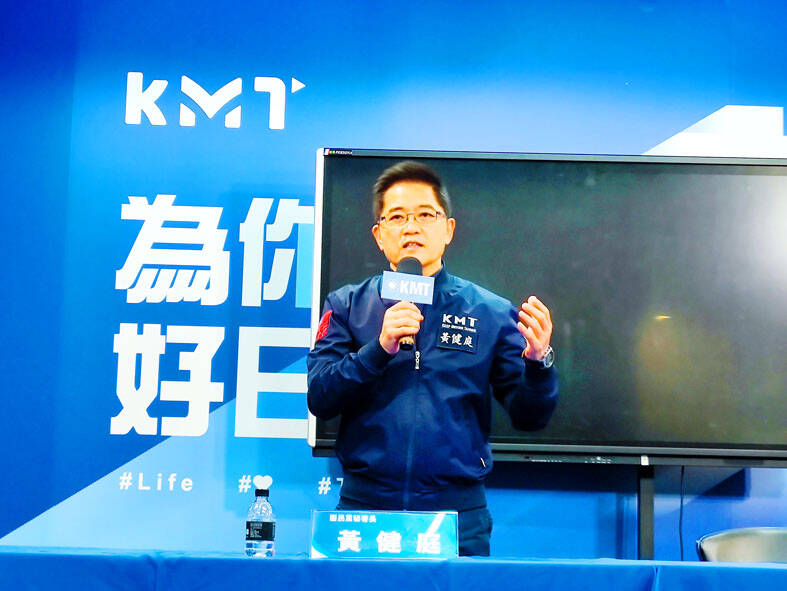The Chinese Nationalist Party (KMT) is abolishing a controversial central election strategy committee, KMT Secretary-General Justin Huang (黃健庭) said yesterday.
Huang, who was tapped to head the committee, said the KMT would continue its established method to nominate candidates for elections.
The KMT’s candidates in next year’s legislative and presidential elections would be ratified by the party’s Central Nomination Committee, whose members would be selected by KMT Chairman Eric Chu (朱立倫), Huang said, adding that the nomination committee would include city and county government heads.

Photo: CNA
The new election body, which was announced at a KMT Central Standing Committee meeting on Wednesday, had been controversial even among party members.
The committee was to include several controversial figures, such as former Tainan City Council speaker Lee Chuan-chiao (李全教) and former Hualien County commissioner Fu Kun-chi, who have both served time in prison.
Party members such as former Tainan City councilor Hsieh Lung-chieh (謝龍介), Broadcasting Corp of China chairman Jaw Shaw-kong (趙少康), Taichung Mayor Lu Shiow-yen (盧秀燕) and New Taipei City Mayor Hou You-yi (侯友宜) criticized the plan.
Taipei City Councilor Chung Pei-chun (鍾沛君) resigned as KMT Cultural and Communications Committee deputy director-general to protest the move.
Fu on Friday challenged Hou to seek the party’s presidential nomination and “take over” the new committee.
Jaw said Fu is commonly seen as Chu’s right-hand man, and his comments were signs of a rift between Chu and Hou.
Huang said the new committee was meant to help the party secretary-general negotiate with potential candidates and suggest members who could run for office in areas where the party is expected to face difficulties.
However, the new committee would be unnecessary, Huang said, adding that the plan had created trouble.
Even though the new committee would not start to operate, KMT members who seek to run in next year’s elections could send it their applications from Wednesday to Friday, Huang said.
Fu yesterday wrote on Facebook that he respected the decision to abolish the committee.
“We are the silent volunteers for the party,” Fu wrote.
On Friday, Chu took responsibility for the controversy, saying that “all faults are mine to bear.”
The plan to set up the new committee was also criticized from outside the KMT, and its change of heart did not satisfy some critics.
Democratic Progressive Party spokesman Chang Chih-hao (張志豪) said the move was aimed at deceiving the public and covering up the KMT’s return to “black gold” politics.
“Black gold” politics refers to alleged connections between government officials and organized crime.
The KMT abolished the plan when it became clear that some of its members had such connections, Chang said.
Chang accused prominent KMT members of corruption, singling out Penghu County Council Speaker Chen Chao-ling (陳昭玲), Yunlin County Council Speaker Shen Tsung-lung (沈宗隆), Miaoli County Commissioner Chung Tung-chin (鍾東錦), Taoyuan City Council Speaker Chiu Yi-sheng (邱奕勝), Taipei Deputy Speaker Yeh Lin-chuan (葉林傳), Nantou County Council Speaker Ho Sheng-feng (何勝豐) and Nantou County Council Deputy Speaker Pan Yi-chuan (潘一全).
Additional reporting by Jason Pan

Tropical Storm Gaemi strengthened into a typhoon at 2pm yesterday, and could make landfall in Yilan County tomorrow, the Central Weather Administration (CWA) said yesterday. The agency was scheduled to issue a sea warning at 11:30pm yesterday, and could issue a land warning later today. Gaemi was moving north-northwest at 4kph, carrying maximum sustained winds near its center of up to 118.8kph and gusts of 154.8kph. The circumference is forecast to reach eastern Taiwan tomorrow morning, with the center making landfall in Yilan County later that night before departing from the north coast, CWA weather forecaster Kuan Shin-ping (官欣平) said yesterday. Uncertainty remains and

SEA WARNING LIKELY: The storm, named Gaemi, could become a moderate typhoon on Wednesday or Thursday, with the Taipei City Government preparing for flooding A tropical depression east of the Philippines developed into a tropical storm named Gaemi at 2pm yesterday, and was moving toward eastern Taiwan, the Central Weather Administration (CWA) said. Gaemi could begin to affect Taiwan proper on Tuesday, lasting until Friday, and could develop into a moderate typhoon on Wednesday or Thursday, it said. A sea warning for Gaemi could be issued as early as Tuesday morning, it added. Gaemi, the third tropical storm in the Pacific Ocean this typhoon season, is projected to begin moving northwest today, and be closest to Taiwan on Wednesday or Thursday, the agency said. Today, there would likely

DISRUPTIONS: The high-speed rail is to operate as normal, while several airlines either canceled flights or announced early departures or late arrivals Schools and offices in 15 cities and counties are to be closed today due to Typhoon Gaemi, local governments announced last night. The 15 are: Taipei, New Taipei City, Taoyuan, Tainan, Keelung, Hsinchu and Kaohsiung, as well as Yilan, Hualien, Hsinchu, Miaoli, Chiayi, Pingtung, Penghu and Lienchiang counties. People should brace for torrential rainfall brought by the storm, with its center forecast to make landfall on the east coast between tonight and tomorrow morning, the Central Weather Administration (CWA) said. The agency issued a sea warning for the typhoon at 11:30pm on Monday, followed by a land warning at 11:30am yesterday. As of

CASUALTY: A 70-year-old woman was killed by a falling tree in Kaohsiung as the premier warned all government agencies to remain on high alert for the next 24 hours Schools and offices nationwide are to be closed for a second day today as Typhoon Gaemi crosses over the nation, bringing torrential rain and whipping winds. Gaemi was forecast to make landfall late last night. From Tuesday night, its outer band brought substantial rainfall and strong winds to the nation. As of 6:15pm last night, the typhoon’s center was 20km southeast of Hualien County, Central Weather Administration (CWA) data showed. It was moving at 19kph and had a radius of 250km. As of 3pm yesterday, one woman had died, while 58 people were injured, the Central Emergency Operation Center said. The 70-year-old